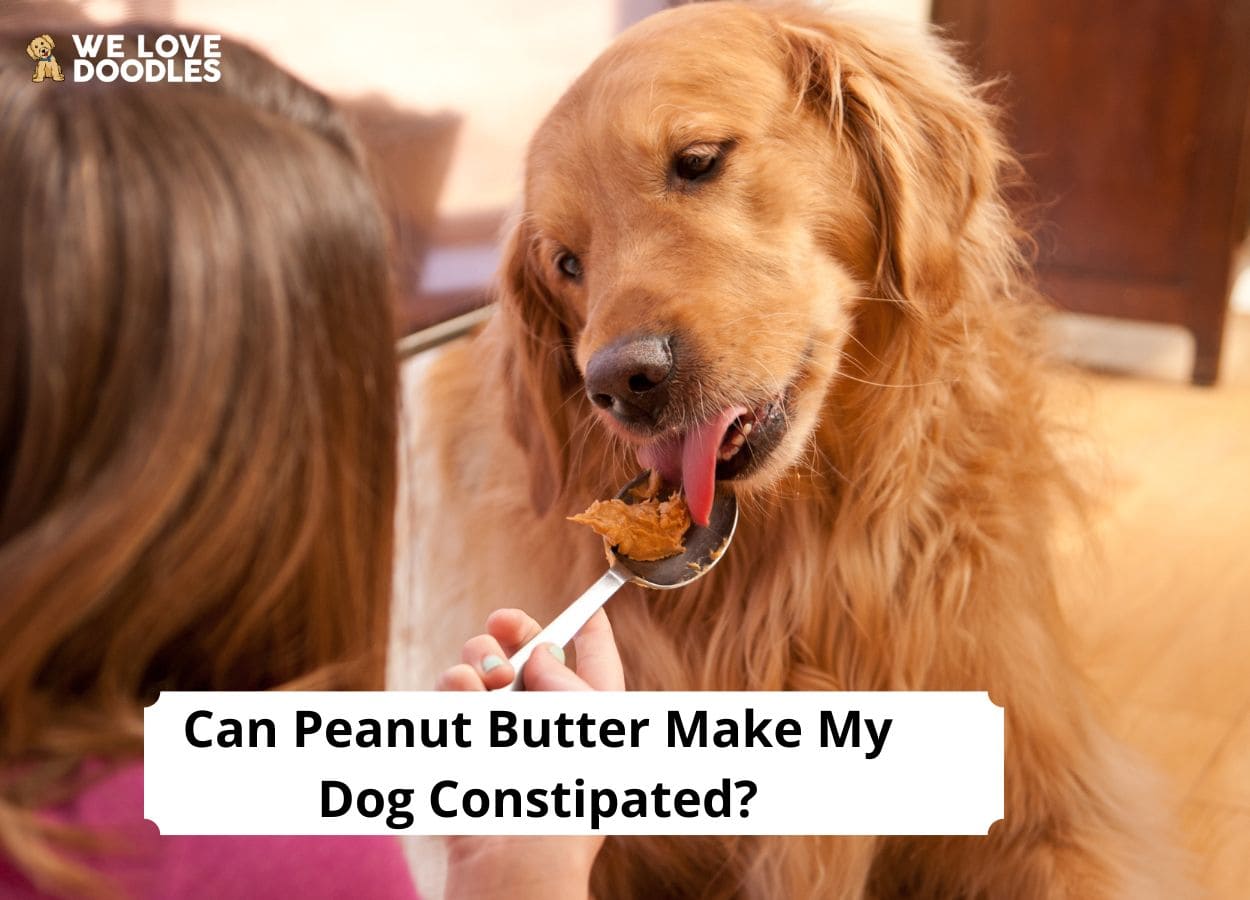Can peanut butter make my dog constipated, and what are the advantages and disadvantages? Peanut butter can be a dog owner’s best friend, especially when your dog needs some medication, is feeling ill or needs to be occupied. However, some dog owners may get frightened if they see their precious puppy starting to seem sick, having issues pooping, or getting diarrhea.
Peanut butter and dogs have gone together for decades, and there are plenty of reasons for that. Although some dog owners may be concerned with peanut butter making their dogs constipated, there are plenty of benefits to using peanut butter.
For example, peanut butter contains plenty of vitamins and minerals for boosting your dog’s health. However, there are some concerns to be aware of, and you may have to read the ingredient label on your next jar of peanut butter. Read on to discover the dangers behind some peanut butter varieties and how peanut butter affects your dog’s digestive health.
Before you scroll down to a more in-depth answer to this guide, “Can Peanut Butter Make My Dog Constipated,” you can check out these other dog-related questions from our team at We Love Doodles: Can Dogs Eat Sugar Cane and Can My Dog Sleep With a Cone On?
Does Peanut Butter Constipate Dogs?
Peanut butter won’t make your dog constipated. Although it may seem like giving your dog peanut butter may cause your puppy to feel more stopped-up than usual, this food will have little impact on constipation. Peanut butter may not be the culprit of your dog’s constipation, but other dietary factors can contribute.
For example, your dog may have eaten something it shouldn’t, like toys, soil, fabric, or bedding. Some young dogs may not realize that eating random objects around the home can upset their tummy, and your dog may continue to eat these items.
Other causes of constipation can include the following:
- Dehydration
- Eaten hair
- Lack of exercise
- Too much fiber
You can help your dog navigate constipation by feeding them pumpkin puree or taking note of their symptoms to discuss with their veterinarian.
More Dog-Related Guides: Can Dogs Eat Goldfish Crackers? and Can Dogs Have Blueberries to Eat?
Does Peanut Butter Help Dogs With Constipation?
Peanut butter can be essential in easing your dog’s constipation symptoms and keeping constipation at bay. Peanut butter may be sticky, but it contains plenty of protein, vitamins, and minerals that your precious puppy’s body can use to get to a healthy place. Peanut butter is an excellent vitamin B5, iron, potassium, and zinc source.
Although they may seem constipated, a scoop or two of peanut butter can help them feel better and give them the nutrients they need to overcome their digestive issues. Peanut butter has fiber and fat. Fat is challenging for dogs to process, but the fat in peanut butter can trigger a bowel movement that can prevent or treat constipation in dogs.
More Dog-Related Guides: Can I Use Tile to Track My Dogs and Can Dogs Have Condensed Milk?
The Benefits of Peanut Butter for Dogs
When you pick the correct type of peanut butter, your precious puppy can be in for a great time. Not only is peanut butter full of healthy vitamins and minerals, but it can boost your dog’s energy levels, provide them with protein, and offer them plenty of fun with their toys. Peanut butter can be a perfect tool to deliver some medications. Consider using an all-natural jar of peanut butter to help your dog remain healthy, happy, and satisfied.
More Dog-Related Guides: Can Older Dogs Get Parvo and Can Dogs Eat Freeze Dried Strawberries?
1. Peanut Butter Can Be An Excellent Source of Protein For Dogs
Peanut butter is an excellent source of protein and can offer your dog a boost in its diet. Dogs need protein because it is an essential building block for their cells and vital for growth. Without adequate protein, a dog may suffer from weak muscles and lethargy.
Dogs without adequate protein intake may have frequent diarrhea, lose weight, and have less energy than their other doggy friends. In some cases, dogs may even have trouble breathing correctly and can get swollen if they aren’t eating enough protein.
Most of your dog’s protein will come from their kibbles and wet food, but an added scoop of peanut butter every few days can give them a boost and offer plenty of vitamins and minerals.
More Dog-Related Guides: Can Dogs Eat Sprinkles?
2. Peanut Butter Helps Boost Energy For Dogs
Your dog may see a boost in energy when they eat a scoop of peanut butter every few days. This boost in energy can help them get the exercise they need, go for walks, and help build their muscles.
This added energy boost can be essential for dogs who struggle with joint pains or other conditions that make them feel tired. Be careful not to try this trick too often, as it can make your dog feel sick and trigger diarrhea.
More Dog-Related Guides: Can You Milk a Dog and Can a Dog Kill a Lion?
3. Peanut Butter Keeps Your Dog More Occupied
You can keep your dog occupied when you give them a scoop of peanut butter every few days, especially when you put that scoop inside a toy of their choosing. Some toys are perfect for hiding away treats or wiping the insides with peanut butter.
Not only will this keep your dog occupied, but it will help them engage in their instincts to hunt. Although this trick works well to give you and your dog some downtime, it shouldn’t be used too often. Your dog may depend on the peanut butter and refuse to use their toy unless there is peanut butter.
More Dog-Related Guides: Can Dogs Eat Garlic Bread and Can Dogs Have Garlic Powder?
4. Peanut Butter Helps With Digestion For Your Dog
Peanut butter can help clear some constipation and help your dog’s bowel movements continue as normal. This assistance will help with minor constipation but likely not severe digestive issues. Use peanut butter if you notice your dog struggling to make a bowel movement for more than one day. However, take note of your dog’s behavior and consult a veterinarian with any concerns you may have about their behavior.
More Dog-Related Guides: Can Brother and Sister Dogs Have Puppies and Can Dogs Get a Brain Freeze?
5. Peanut Butter Helps With Medications For Your Dog
Peanut butter is a perfect companion for medications that dogs don’t like to take. Pills, liquids, and other medications mix well with peanut butter; most dogs won’t notice anything amiss with their treat. Supervise your dog carefully when trying to administer medication inside of its scoop of peanut butter. Some dogs are clever and may dispel the pill before they swallow it.
More Dog-Related Guides: Can Dogs Eat Mochi and Can Dogs Eat Pepper Jack Cheese?
The Disadvantages of Peanut Butter for Dogs
Although peanut butter is a perfect tool for your precious puppy, there are some things to consider when choosing your peanut butter. Certain kinds of peanut butter can prove more harmful than good.
Avoid peanut butter varieties with excess sugars and an artificial sweetener named Xylitol. Choosing an all-natural peanut butter made with simple ingredients can help prevent any disadvantages of peanut butter in dogs. All-natural peanut butter varieties can provide all the benefits without any concern.
More Dog-Related Guides: Can Dogs Eat Corn Starch?
1. Some Peanut Butter Can Contain Too Much Sugar For Your Dog
Your dog should never have too much sugar. Sugars, even naturally-occurring sugars in fruits and vegetables, can cause your dog to have diarrhea or vomit. Always double-check the ingredient label on everything you choose to feed your dog.
Your dog’s treats, sweets, and other items should never have excess sugars. If you allow your dog to have sugar, choose a naturally-occurring sugar since these will come from a natural source and have a lesser impact on your dog’s tummy.
More Dog-Related Guides: Can Dogs Eat Orange Chicken and Are Dogs Cannibals?
2. Some Peanut Butter May Contain Xylitol, Which is Deadly For Dogs
Xylitol is a sugar substitute often found in human foods, but it can be deadly for dogs. Unfortunately, your dog won’t be able to tell the difference between any other sugar and Xylitol, making it even more dangerous. Xylitol can go under different names on human food products, like birch sugar.
You may think this product is just a form of sugar, but it’s an artificial sweetener that can have terrible side effects on your dog. This type of sugar can be found in medicines, dietary supplements, and sugar-free sweets. Although your dog won’t be eating these items, they may get inquisitive and paws on them, making them a threat to any dog in the home.
More Dog-Related Guides: Can Dogs Eat Cream Cheese and Can Dogs Get Sexually Attracted to Humans?
3. Some Peanut Butter Have Semi-Short Shelf Life, Which Can Be Bad For Dogs
Peanut butter can only be kept open in the pantry for two or three months. Always double-check the expiration date on your peanut butter to ensure you are not offering your expired dog products. Giving your dog expired peanut butter can result in many negative side effects, including upset stomach, vomiting, diarrhea, and whining.
Peanut butter is a perfect treat for your dog, but the shelf life is long enough to forget about the product but short enough that it can go bad quickly. Add peanut butter to your shopping list every three months to prevent your dog from eating an expired product.
More Dog-Related Guides: Can You Use Desitin on Dogs and Can Dogs Eat Rice Krispies?
How Much Peanut Butter Should I Give My Dog to Eat?
Offering your dog peanut butter daily can cause stomach aches and diarrhea. However, a single scoop every few days is enough to keep your dog healthy and happy. Please track how often you give your dog peanut butter to ensure you do not allow them to overindulge in the salty-sweet treat.
A scoop of peanut butter should be no more than a tablespoon and likely not contain more than 200 calories. Peanut butter is calorically dense and gives your dog plenty of excess weight if you aren’t careful with rationing the treat.
More Dog-Related Guides: Why is My Dog So Cuddly All of a Sudden and Why Does My Dog Keep Sniffing My Legs?
Signs of Your Dog Having Too Much Peanut Butter
Too much of a good thing is a bad thing. Although dogs adore peanut butter, eating too much will trigger many symptoms that can make them unwell. Your dog may vomit, have diarrhea, or gain weight if they consistently eat too much peanut butter. The first sign that your dog is eating too much peanut butter may be diarrhea.
Take note of your dog’s bowel movements. If they are liquid or have a soft consistency, your dog may have an excess of sugars and fats in its diet. Consider checking the label on your peanut butter to ensure there is no added sugar and reduce the amount of peanut butter you offer to keep them healthy and tummy-ache-free.
More Dog-Related Guides: Why Does My Dog Keep Biting My Cat’s Neck and Why Does My Dog Lick Me in the Morning?
Conclusion For “Can Peanut Butter Make My Dog Constipated”
Peanut butter does not cause constipation in dogs, and it can assist in relieving constipation. Peanut butter is full of protein, vitamins, and minerals that can help your dog feel at its best. Additionally, peanut butter can help lethargic or lazy dogs boost energy, which can have them running around the backyard and getting plenty of exercises.
Peanut butter can be a perfect companion for dogs on regular medications and needing help getting them down. This food type may also help your precious puppy stay occupied with its toys and engage its instincts to hunt. However, not all peanut butter varieties are created equal.
Some peanut butter types may contain harmful ingredients that can cause gas, diarrhea, or toxicity. Xylitol, for example, can lead to death when dogs consume it in excess. Always remember the ingredient label and choose a peanut butter variety with simple, natural ingredients.
If you find this guide, “Can Peanut Butter Make My Dog Constipated,” you can check out these other dog-related guides from our team:
Before giving your companion peanut butter, you can check out what human food you can or cannot give your dog by watching “Human Foods That Are Good For Dogs” down below:

Andy is a full-time animal rescuer and owner of a toy doodle. When he’s not saving dogs, Andy is one of our core writers and editors. He has been writing about dogs for over a decade. Andy joined our team because he believes that words are powerful tools that can change a dog’s life for the better.
Why Trust We Love Doodles?
At We Love Doodles, we’re a team of writers, veterinarians, and puppy trainers that love dogs. Our team of qualified experts researches and provides reliable information on a wide range of dog topics. Our reviews are based on customer feedback, hands-on testing, and in-depth analysis. We are fully transparent and honest to our community of dog owners and future owners.















